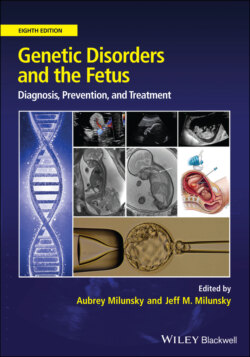Читать книгу Genetic Disorders and the Fetus - Группа авторов - Страница 21
Knowledge of disease
ОглавлениеThe need for a counselor to have extensive factual knowledge about disease in general, as well as about the disease for which counseling is being provided, hardly needs emphasis. Such knowledge should include how the diagnosis is made and confirmed, the test accuracy and limitations, the important comorbidities, the recurrence risks, the mode of inheritance, the tests available to detect a carrier (and their detection rates), the heterogeneity and pleiotropic nature of the disease, the quality of life associated with survival, prognosis, and the causes of death. When relevant, it is necessary to know about treatment and its efficacy. The explosive growth of information and data available in numerous gene databases stemming from gene discovery presents an overwhelming challenge for physicians and genetic counselors. Meeting the demand for excellence is best accomplished in tandem with a geneticist and team where possible. One important example concerns sudden unexpected death before 45 years of age.173–175 A wide range of arrhythmia syndromes and cardiomyopathies with many known genes allow “molecular autopsies.”176 Where DNA was not obtained from inevitable autopsies, recovery of analyzable material can be achieved from retained tissue blocks. Pathologists increasingly recognize the importance of retaining tissue (e.g. liver) for freezing without preservative.
Another challenge is the growing list of syndromes or conditions due to discovery of an expanding long list of culprit neurodevelopmental genes and their pathogenic variants,177, 178 a significant number being due to de novo variants.179 The KBG syndrome serves as a typical example, with characteristic dysmorphic features, macrodontia of upper central incisors, skeletal abnormalities, short stature, and intellectual disability, confirmed by pathogenic variants in the ANKRDII gene.180
Recognition that highly variable phenotypes exemplified by the 22q11 deletion syndrome and confounded by changes with increasing age can make the family history difficult to interpret.181–183
Certain phenotypes may emerge as a consequence of environmental exposure or gene mutation, interpretation being further compounded by the presence or absence of ischemic encephalopathy at birth.184, 185 Microcephaly serves as an ideal example with multiple known single genes and viruses (such as Zika) (see Chapter 34).186–188 Online Mendelian Inheritance in Man (OMIM) has over 900 phenotype entries and almost 800 genes linked for microcephaly with variable expressivity.188
A not infrequent challenge is to determine whether a brain injury (hypoxia) or a genetic disorder was the cause of intellectual disability, presenting as cerebral palsy.184, 185 Typical cerebral palsy mimics include hereditary spastic paraplegia, dystonic disorders, and choreic movement disorders.189 Multiple genes are known for the cerebral palsy mimics.189–191
The physician or genetic counselor who initiates genetic counseling for an apparently straightforward indication (e.g. advanced maternal age) may find one or more other familial conditions with which he or she has little or no familiarity. Such circumstances dictate referral for specialist consultation. A National Confidential Enquiry into counseling for genetic disorders by nongeneticists in the United Kingdom revealed that less than half of those with known high genetic risks were referred to medical geneticists.192 That study focused on a review of 12,093 “genetic events” involving potentially avoidable cases of Down syndrome, NTDs, cystic fibrosis, β‐thalassemia, and multiple endocrine neoplasia. Medical record reviews were frustrated by the poor quality of clinical notes, which lacked evidence of counseling. An urgent call was made for genetic management to be at least as well documented as surgical operations, drug records, and informed consent. A Dutch study evaluated the levels of knowledge, practical skills, and clinical genetic practices of 643 cardiologists. They noted low levels of self‐reported knowledge and that only 38 percent had referred patients to clinical geneticists.193 Other physicians, too, have been found lacking in the necessary knowledge and communication skills.184, 194–198 Given the importance of genetic considerations in all specialties, these problems can be anticipated to become increasingly problematic, more especially in family practice.198, 199
After the prenatal diagnosis of a serious genetic disorder, the geneticist/genetic counselor should be able to inform the family fully about the anticipated burden and to detail the effects of this burden on an affected child, the family, other siblings, the family economics, and marital relations, along with any other pros and cons of continuing pregnancy. The reality of early Alzheimer disease and other comorbidities in Down syndrome and the care requirements that may devolve on the siblings should not be omitted from the discussion. Exact details should also be known about the availability, options, and risks of elective abortion (see Chapter 32), as well as the possibility of adoption.
